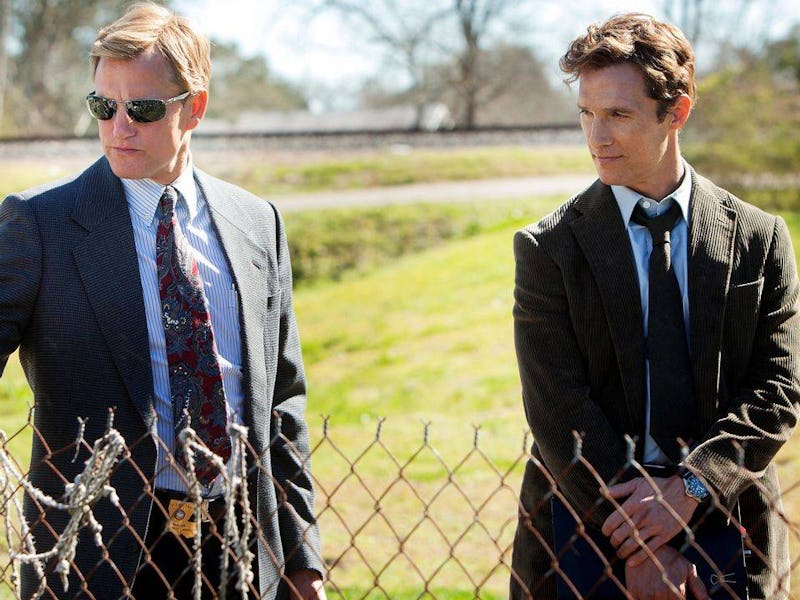Nowadays, the thought of a major movie star appearing in an ongoing TV show or limited series doesn’t seem strange. We’re currently living in a time when Tom Hanks will make a cameo appearance in 1883, Gary Oldman will star as the lead of his own Apple TV+ drama, and Oscar winners like Michelle Yeoh and Jessica Chastain will regularly appear in their own streaming shows. Ten years ago, though, the line between TV and film wasn’t one that was routinely crossed by movie stars.
That all changed when True Detective premiered on HBO in 2014. The show’s first season, led by Woody Harrelson and Matthew McConaughey, debuted when the latter was in the midst of an Oscar campaign that would prove successful less than two full months later. Outside of a few cameo appearances on Eastbound & Down, True Detective marked the first TV show that McConaughey had ever starred in, and it was the first in nearly 15 years that Harrelson had worked on. McConaughey’s participation in True Detective, in particular, made an impact that cannot be overstated.
At the time, he was one of the most popular actors in the world and was experiencing a creative renaissance that had garnered him the respect and support of both cinephiles and casual moviegoers alike. His role in True Detective, therefore, not only seemed to break the invisible barrier that had previously barred most movie stars from taking on leading roles on TV, but it also confirmed what shows like Mad Men, Game of Thrones, Breaking Bad, and The Sopranos had already led many to suspect: TV had become creatively exciting and fulfilling enough for anyone to enter its sphere without needing to worry about losing their coveted star status.
10 years later, True Detective Season 1 is still just as stunning of a narrative and technical achievement as it was in 2014.
True Detective Season 1’s star power isn’t the only thing about it that is noteworthy 10 years later. The season was also written solely by Nic Pizzolatto and directed entirely by one filmmaker, Cary Joji Fukunaga. Both were creative choices that weren’t common in the television medium, but it was Fukunaga’s contributions that felt particularly revolutionary at the time. TV had previously always placed more of an emphasis on its cast and writers’ efforts than its filmmakers’. Fukunaga’s sole direction gives True Detective Season 1 a visual and editorial cohesiveness that felt unique at the time of its release, and which caught the attention of awards voters and those within the industry. (Fukunaga went on to receive an Emmy for his work on the show.)
Altogether, True Detective Season 1’s cast, filmmaker, and time-bending structure give it a cinematic quality that had previously proven elusive on TV. The show made the oft-coined term among Prestige TV creators of an “eight-hour movie” seem far less ridiculous than it did before. Its story moves fluidly from episode to episode, and Adam Arkapaw’s cinematography imbues the season with a visual dynamism that had rarely, if ever, been seen on TV before. With their now-famous six-minute unbroken take, which caps off True Detective’s fourth episode, Fukunaga and Arkapaw also normalized the kind of technically impressive directorial flourishes that had previously been rare on television.
Narratively, True Detective Season 1 isn’t all that unique. It is, in many ways, a familiar crime drama about a pair of unlikely police detective partners. For all of its cosmic horror touches and occult details, it ultimately follows a similar path as numerous other crime films and shows. It wasn’t True Detective Season 1’s story that made it such a hit, though, but the high level of talent and technical precision that was brought to it. The season proved to many that a TV show could be just as visually and narratively ambitious as any film. In doing so, it helped pave the way for a more expensive, cinematic era of TV storytelling.
True Detective Season 1 has had a lasting, tangible effect on the TV industry.
In the years since True Detective Season 1 premiered, more and more directors have taken on entire seasons of television on their own, including Sam Esmail (Mr. Robot), Steven Soderbergh (The Knick, Full Circle), and Jean-Marc Vallée (Big Little Lies, Sharp Objects). The same goes for writers tackling whole seasons alone, like Craig Mazin (Chernobyl), Mike White (The White Lotus), and Taylor Sheridan (1883, Special Ops: Lioness). What had once been phenomena that seemed to only rarely occur in the British TV industry have become commonplace now.
That’s to say nothing of how Matthew McConaughey and Woody Harrelson’s star turns in True Detective were perceived by their peers as an invitation to dip their toes into the television pool as well. Now, almost 10 years after True Detective premiered, the series is set to return this weekend with its fourth season. The season, titled True Detective: Night Country, counts Jodie Foster among its cast.
The fact that Foster’s involvement doesn’t seem out of the ordinary or especially noteworthy is proof enough of how much the television landscape has changed since True Detective premiered in 2014. That’s thanks, in no small part, to the success of its first, still-beloved season.
